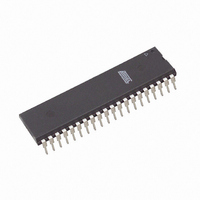ATMEGA16A-PU Atmel, ATMEGA16A-PU Datasheet - Page 190

ATMEGA16A-PU
Manufacturer Part Number
ATMEGA16A-PU
Description
MCU AVR 16K FLASH 16MHZ 40-PDIP
Manufacturer
Atmel
Series
AVR® ATmegar
Specifications of ATMEGA16A-PU
Core Processor
AVR
Core Size
8-Bit
Speed
16MHz
Connectivity
I²C, SPI, UART/USART
Peripherals
Brown-out Detect/Reset, POR, PWM, WDT
Number Of I /o
32
Program Memory Size
16KB (8K x 16)
Program Memory Type
FLASH
Eeprom Size
512 x 8
Ram Size
1K x 8
Voltage - Supply (vcc/vdd)
2.7 V ~ 5.5 V
Data Converters
A/D 8x10b
Oscillator Type
Internal
Operating Temperature
-40°C ~ 85°C
Package / Case
40-DIP (0.600", 15.24mm)
Processor Series
ATMEGA16x
Core
AVR8
Data Bus Width
8 bit
Data Ram Size
1 KB
Interface Type
2-Wire/SPI/USART
Maximum Clock Frequency
16 MHz
Number Of Programmable I/os
32
Number Of Timers
3
Maximum Operating Temperature
+ 85 C
Mounting Style
Through Hole
3rd Party Development Tools
EWAVR, EWAVR-BL
Development Tools By Supplier
ATAVRDRAGON, ATSTK500, ATSTK600, ATAVRISP2, ATAVRONEKIT
Minimum Operating Temperature
- 40 C
On-chip Adc
8-ch x 10-bit
Package
40PDIP
Device Core
AVR
Family Name
ATmega
Maximum Speed
16 MHz
Operating Supply Voltage
3.3|5 V
Controller Family/series
AVR MEGA
No. Of I/o's
32
Eeprom Memory Size
512Byte
Ram Memory Size
1KB
Cpu Speed
16MHz
Rohs Compliant
Yes
For Use With
ATSTK600 - DEV KIT FOR AVR/AVR32ATSTK500 - PROGRAMMER AVR STARTER KIT
Lead Free Status / RoHS Status
Lead free / RoHS Compliant
Available stocks
Company
Part Number
Manufacturer
Quantity
Price
Part Number:
ATMEGA16A-PU
Manufacturer:
AT
Quantity:
20 000
- Current page: 190 of 352
- Download datasheet (8Mb)
190
ATmega16A
Figure 20-13. Data Transfer in Master Receiver Mode
A START condition is sent by writing the following value to TWCR:
TWEN must be written to one to enable the Two-wire Serial Interface, TWSTA must be written to
one to transmit a START condition and TWINT must be set to clear the TWINT Flag. The TWI
will then test the Two-wire Serial Bus and generate a START condition as soon as the bus
becomes free. After a START condition has been transmitted, the TWINT Flag is set by hard-
ware, and the status code in TWSR will be $08 (See
SLA+R must be transmitted. This is done by writing SLA+R to TWDR. Thereafter the TWINT bit
should be cleared (by writing it to one) to continue the transfer. This is accomplished by writing
the following value to TWCR:
When SLA+R have been transmitted and an acknowledgement bit has been received, TWINT is
set again and a number of status codes in TWSR are possible. Possible status codes in Master
mode are $38, $40, or $48. The appropriate action to be taken for each of these status codes is
detailed in
Flag is set high by hardware. This scheme is repeated until the last byte has been received.
After the last byte has been received, the MR should inform the ST by sending a NACK after the
last received data byte. The transfer is ended by generating a STOP condition or a repeated
START condition. A STOP condition is generated by writing the following value to TWCR:
A REPEATED START condition is generated by writing the following value to TWCR:
After a repeated START condition (state $10) the Two-wire Serial Interface can access the
same Slave again, or a new Slave without transmitting a STOP condition. Repeated START
enables the Master to switch between Slaves, Master Transmitter mode and Master Receiver
mode without losing control over the bus.
TWCR
Value
TWCR
Value
TWCR
Value
TWCR
Value
SDA
SCL
Table
TWINT
TWINT
TWINT
TWINT
1
1
1
1
20-3. Received data can be read from the TWDR Register when the TWINT
Device 1
RECEIVER
MASTER
TWEA
TWEA
TWEA
TWEA
X
X
X
X
TRANSMITTER
Device 2
SLAVE
TWSTA
TWSTA
TWSTA
TWSTA
1
0
0
1
Device 3
TWSTO
TWSTO
TWSTO
TWSTO
0
0
1
0
........
Table
TWWC
TWWC
TWWC
TWWC
X
X
X
X
20-2). In order to enter MR mode,
Device n
V
TWEN
TWEN
TWEN
TWEN
CC
1
1
1
1
R1
–
0
–
0
–
0
–
0
R2
8154B–AVR–07/09
TWIE
TWIE
TWIE
TWIE
X
X
X
X
Related parts for ATMEGA16A-PU
Image
Part Number
Description
Manufacturer
Datasheet
Request
R

Part Number:
Description:
Manufacturer:
Atmel Corporation
Datasheet:

Part Number:
Description:
IC AVR MCU 16K 16MHZ 5V 44TQFP
Manufacturer:
Atmel
Datasheet:

Part Number:
Description:
IC AVR MCU 16K 16MHZ 5V 44-QFN
Manufacturer:
Atmel
Datasheet:

Part Number:
Description:
IC AVR MCU 16K 16MHZ 5V 40DIP
Manufacturer:
Atmel
Datasheet:

Part Number:
Description:
MCU AVR 16K FLASH 16MHZ 44-QFN
Manufacturer:
Atmel
Datasheet:

Part Number:
Description:
IC AVR MCU 16K 16MHZ COM 40-DIP
Manufacturer:
Atmel
Datasheet:

Part Number:
Description:
IC AVR MCU 16K 16MHZ COM 44-QFN
Manufacturer:
Atmel
Datasheet:

Part Number:
Description:
IC AVR MCU 16K 16MHZ IND 40-DIP
Manufacturer:
Atmel
Datasheet:

Part Number:
Description:
IC AVR MCU 16K 16MHZ IND 44-QFN
Manufacturer:
Atmel
Datasheet:

Part Number:
Description:
IC AVR MCU 16K 16MHZ IND 44-TQFP
Manufacturer:
Atmel
Datasheet:

Part Number:
Description:
IC MCU 8BIT 16KB FLASH 44TQFP
Manufacturer:
Atmel
Datasheet:

Part Number:
Description:
MCU AVR 16K FLASH 16MHZ 44-TQFP
Manufacturer:
Atmel
Datasheet:

Part Number:
Description:
IC AVR MCU 16K 16MHZ COM 44-TQFP
Manufacturer:
Atmel
Datasheet:











